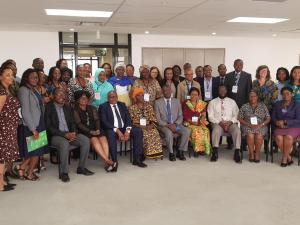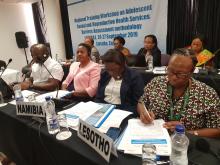Zambia hosts the first Regional Training Workshop on Adolescent Sexual and Reproductive Health Services Barriers Assessment Methodology (AHSBA)
The WHO Regional Office for Africa in collaboration with WHO Headquarters, UNICEF, UNFPA and other partners has organized an inter-country regional workshop aimed at training national adolescent health focal points and partners on Adolescent Sexual and Reproductive Health Services Barriers Assessment Methodology (AHSBA). The 4 days workshop which has brought together participants from 11 countries has been organized to develop in country capacity for identifying barriers which prevent disadvantaged adolescents from accessing effective health services. Universal Health Coverage is a critical priority of the 2030 Sustainable Development Goals agenda. All adolescents therefore have a right to have a fair opportunity to attain their full health potential without being disadvantaged. However, in many countries, some adolescent subpopulations do not have effective coverage of health services.
This training will introduce the participants to the WHO handbook for conducting an adolescent health services barriers assessment with a focus on disadvantaged adolescents. To complement the AHSBA training modules, participants will also get hands on training on how to use the HEAT software, EQUIST adolescent health module and the gender analysis tool. Country teams will also explore opportunities to mobilise resources for adaptation of the AHBSA and its implementation.
The WHO Representative, Dr. Nathan Bakyaita stated that AHBSA was anchored on the Global Accelerated Action for Health of Adolescents (AHHA), a global initiative by WHO and its partners aimed at helping governments to invest in the health and wellbeing of adolescents and the Global Strategy for Women, Children and Adolescent Health 2016-2030. He reiterated that WHO and the other UN agencies would continue supporting government in its quest to move towards Universal Health Coverage of adolescent health services.
The Permanent Secretary at the Ministry of Health, Dr. Kennedy Malama stated that although countries had made progress in improving adolescent health services, a lot was still needed to be done because there was great inequality among adolescents in relation to the coverage of health care services. “ Adolescents from low in-come households, rural dwellers, adolescents in urban slums, out-of-school adolescents, those who live far from health, adolescents living with disabilities and younger adolescents aged 10-14 years are the most disadvantaged” he said. He said that the AHBSA training was timely as it would develop in-country capacity for identifying barriers which prevent adolescents from accessing health services and trigger remedial action which would result in more equitable health outcomes among adolescents.
The participating countries include: Chad, Ethiopia, Guinea, Lesotho, Liberia, Madagascar, Mali, Namibia, Rwanda, South Africa, Uganda.




